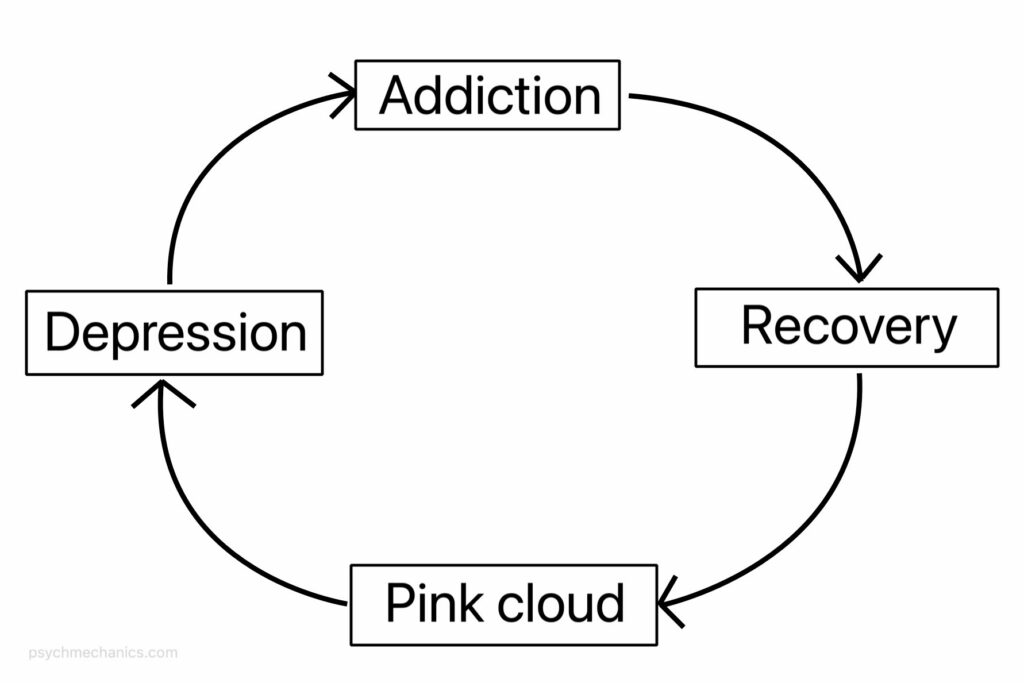The pink cloud syndrome is a phenomenon in addiction recovery where a person experiences euphoria and optimism when they finally get rid of their addiction. Other than feeling joy and extreme optimism, the syndrome is characterized by:
- Being excited about recovery
- Being confident in one’s ability to recover
- Elevated mood and energy
- Positive outlook toward life
- Believing that cravings won’t occur
- Being detached from reality
- Experiencing calm and peace
- Believing that recovery will be easy
Small wins are great and should be celebrated. Those who are pink clouding, however, over-celebrate their small wins. Because addiction and the subsequent withdrawal symptoms put them in such a low and dark place, they’re overjoyed as the pendulum swings in the opposite direction.
People in the pink cloud phase tend to make sweeping life changes. They’ll make grand plans for the future. They’ll seek to crush their goals in every single life area. They’ll stop doing the things they did to recover because they believe they no longer need to do them. They’ll bravely put themselves in situations that used to trigger them, thinking they will no longer get triggered.
Pink cloud depression (PAWS)
The pink cloud effect is temporary. The good feelings don’t last. They certainly help infuse optimism and hope, but you have to return to reality sooner or later. You can’t always make strides in recovery and feel euphoric about them. Eventually, recovery comes down to making consistent, hard choices daily.
Realizing this can be disappointing, depressing, and anxiety-inducing for someone whose expectations had skyrocketed in the pink cloud phase.1Bahji, A., Crockford, D., & El-Guebaly, N. (2022). Neurobiology and symptomatology of post-acute alcohol withdrawal: a mixed-studies systematic review. Journal of Studies on Alcohol and Drugs, 83(4), 461-469. They suffer from pink cloud depression. It’s part of Post-Acute Withdrawal Syndrome (PAWS), also called Protracted Withdrawal Syndrome (PWS). Hitting this low point makes them more susceptible to relapse, continuing the vicious cycle of addiction.2Haskell, B. (2022). Identification and Evidence-Based Treatment of Post–Acute Withdrawal Syndrome. The Journal for Nurse Practitioners, 18(3), 272-275.

Note: Not all who're recovering from addiction go through the pink cloud phase.
Pink cloud depression isn’t just caused by the crash after the euphoria of the pink cloud syndrome. There’s usually more to the story. The clue to the puzzle lies in what made the person develop an addiction in the first place. People typically develop an addiction when they want to escape their major life problems. It’s a flight response. They’re incapable of fighting or facing their life problems head-on.
When they recover from their addiction, they experience withdrawal symptoms. These are desperate appeals from the mind to stay in the prison of addiction and avoid reality. When they do get over these withdrawal symptoms and make significant progress in recovery, they become euphoric, hopeful, and over-optimistic. The pink cloud syndrome becomes a glorified way to avoid reality. When they’re in that phase, they feel so good they’re unwilling to believe they’re still escaping.
Finally, when the pink cloud effect subsides, they have no option but to confront reality. They may have recovered from addiction, but the problems that contributed to their addiction in the first place are still there in their reality. When they face them again, they get depressed again. When they get depressed again, they want to run back to their addiction.
Overcoming the depression
The key is to be realistic in your expectations about recovery. Celebrate small wins, but don’t get carried away on a pink cloud. Recovery takes time and is hard work. But it is possible. Continue doing the things you did to get this far.
Having a structured treatment plan with clearly defined goals and milestones can be very effective in helping you ride the pink cloud. When you know precisely and objectively what recovery entails, you don’t get carried away by transient good feelings. To reiterate, fixing your addiction doesn’t mean you’ve solved your life problems. Overcoming addiction puts you in a better place to face and solve them.

